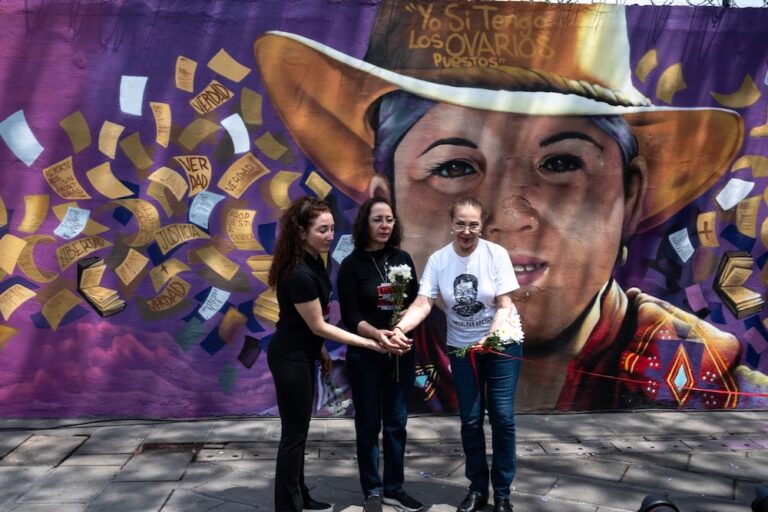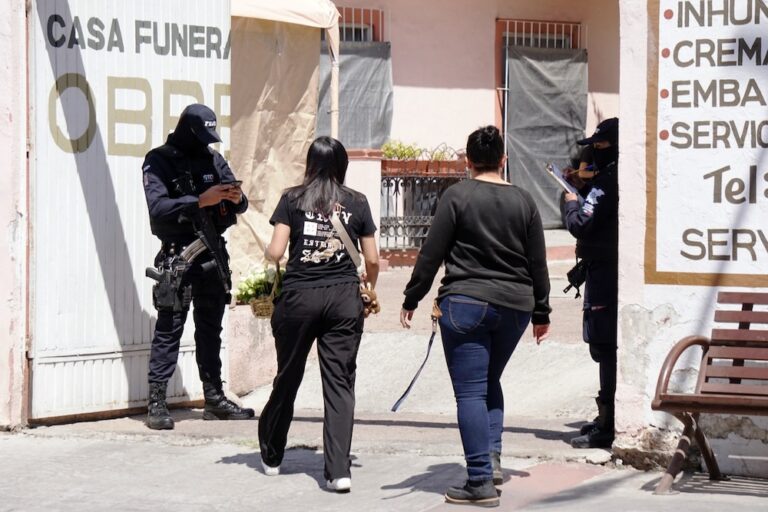(IAPA/IFEX) – The following is a 30 August 2005 IAPA press release: Federalize crimes, stiffen sentences, IAPA urges Mexico’s President Fox – The organization also met with senators, Supreme Court justices and the Attorney General of Mexico – The IAPA delegation today traveled to the northern Mexico city of Hermosillo for its Meeting of Publishers […]
(IAPA/IFEX) – The following is a 30 August 2005 IAPA press release:
Federalize crimes, stiffen sentences, IAPA urges Mexico’s President Fox
– The organization also met with senators, Supreme Court justices and the Attorney General of Mexico
– The IAPA delegation today traveled to the northern Mexico city of Hermosillo for its Meeting of Publishers in the Mexico-United States border region.
MEXICO CITY, Mexico (August 30, 2005) – The Inter American Press Association (IAPA) reiterated yesterday to the three branches of the Mexican government the need for steps to be taken to make crimes against freedom of expression federal offenses exempt of any statute of limitation and to stiffen the punishment for those found guilty of them.
An international delegation from the IAPA, headed by its president, Alejandro Miró Quesada, told Mexican President Vicente Fox of the organization’s concern at the increasing violence being unleashed by organized crime against journalists and news media, particularly in the northern part of the country.
Miró Quesada, editor of the Lima, Peru, newspaper El Comercio, said that government action is essential, as the violence against media outlets and journalists “is leading the Mexican press to a serious state of self-censorship and this brings even more grave consequences for the public in general.”
President Fox, who met with the delegation in his office at the Los Pinos presidential residence, told the delegation that “we share your concern” and said the federal government is seeking, through appropriate legislation, to provide increased training and resources for the police, as well as taking other steps in coordination with state officials to combat organized crime.
Regarding the press, Fox gave his commitment to act on the IAPA’s call, and stated that a number of cases of journalists murdered in recent months had already been transferred to federal jurisdiction under the Mexican Attorney General’s Office.
Miró Quesada acknowledged that the current Mexican administration has taken concrete action regarding crimes against journalists in “the transfer to federal jurisdiction and the joint work of the IAPA and the government being carried out through the Inter-American Commission on Human Rights.”
Gonzalo Marroquín, chairman of the IAPA’s Committee on Freedom of the Press and Information, and Enrique Santos Calderón, chairman of the Impunity Committee, in separate meetings cited of three steps that the IAPA has been suggesting in Mexico as the framework for combating crimes against journalists and the impunity surrounding them ? that the crimes be dealt with under federal jurisdiction, that the Penal Code provide for increased punishment of the guilty, and that the crimes not be subject to any statute of limitation.
Referring to the question of statutes of limitation, the IAPA recalled that in 1997 Mexico had signed Resolution 120 of the United Nations Educational, Scientific and Cultural Organization (UNESCO) which commits member states “to adopt the principle that crimes against the person should not be subject to a statute of limitation when they are committed to impede the exercise of freedom of information and of expression or when they have as their objective the obstruction of justice; that the governments improve legislation to make possible the indictment and conviction of the masterminds of the murder of those exercising the right to freedom of expression and that there be expressed in legal terms that those responsible for crimes against journalists in the exercise of their professional duties and the media should be tried in civil and/or regular courts.”
In addition to Miró Quesada, Marroquín, from Prensa Libre, Guatemala City, Guatemala, and Santos Calderón, from El Tiempo, Bogotá, Colombia, the IAPA delegation included Mexican journalists Andrés García Lavín, Andrés García Gamboa and Héctor Dávalos, Novedades; Francisco Ealy Ortiz and Roberto Rock, El Universal, Mexico City; Idalia Gómez of the IAPA Rapid Response Unit, and Press Freedom Director Ricardo Trotti.
At another meeting, Mexican Attorney General Daniel Cabeza de Vaca told the delegation that “the executive branch has already sent Congress an initiative for constitutional reform concerning the federalization of serious offenses against human rights” which could include a clause on those crimes committed against freedom of the press, such as crimes against journalists.
Deputy Attorneys General Gilberto Higuera and José Luis Vasconcelos reported on the progress of investigations in the cases of journalists brought to the attention of the Attorney General’s Office, among them the murders of Francisco Franco Ortiz, Dolores Guadalupe Escamilla and Raúl Gibb Guerrero and the disappearance of Alfredo Jiménez Mota.
Cabeza de Vaca said it was “very important that there be legislation that guarantees the Attorney General’s Office the power to deal with these cases” in order to avoid conflicts over states’ sovereignty. He added that the proposal could easily include other requests from the IAPA, such as that there be no statutes of limitation.
Among the agreements reached between the Attorney General’s Office and the IAPA was one that will set up an office to serve as a channel of communication and ratification that the journalist cases are being handled by one of the deputy attorney general’s offices.
Deputy Attorney General Higuera said the Attorney General’s Office would continue naming special prosecutors in each of the Mexican states so that, in coordination with state attorneys, they could more effectively deal with the cases of crimes against journalists.
The IAPA also met with Senators Enrique Jackson, who in the next legislative session will become Senate president, and Sadot Sánchez, chairman of the Senate Human Rights Committee.
The senators confirmed that in the area of human rights there are currently 23 proposals for constitutional reform under review by a bi-cameral committee and that some include aspects on press activities. Among these, of vital importance they mentioned the amendment of Constitution’s Article 73, which would provide that cases of serious human rights violations ? among them those restricting free speech and press freedom ? be transferred to federal jurisdiction.
Following the IAPA visit, Senator Jackson said that the Senate could recommend that the Attorney General’s Office have the power to take up cases of crimes against journalists, that a special prosecutor’s office be created, and that greater resources be provided to carry out the work.
He declared that it was “of the utmost importance” to take this matter and the proposal to appoint a special Senate committee to the public tribunal in order to follow up on the cases of journalists and media subjected to violence.
Early in the morning the IAPA mission met with Supreme Court Justices José de Jesús Gudiño Pelayo and José Ramón Cosío. They discussed mutual experiences and concerns regarding the violence which judges and journalists face at the hands of organized crime both in Mexico and elsewhere in Latin America. Out of that meeting came ideas concerning a better relationship between judges and journalists and a dialogue of understanding between the two sectors, which the IAPA initiated two years ago al its Summit with the members of Supreme Courts in the Western Hemisphere.


